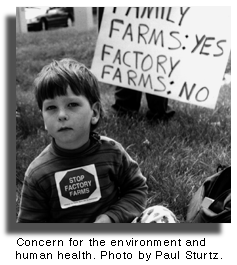|
Genetically-altered soybean harvest
causes controversy by Darren Dean Columbia, Missouri
Roundup Ready Soybeans require the use of Roundup during the entire growing period. Farmers, environmentalists and consumer groups have expressed growing concern that the use of the soybeans may lead to greater chemical use in agricultural fields. Farmers like Bill Christison, president of the Missouri Rural Crisis Center, also question becoming more dependent on companies like Monsanto. "Farmers are apprehensive about entrusting our future to chemical corporations that also own the seed patents. Our independence is on the line here, Christison says. By entering into an agreement with Monsanto, farmers will no longer be allowed to stockpile their seeds . They will be required to buy Monsanto's Roundup Ready Soybeans with each planting season. The full implications of genetically altered food products is not known, although there are several ares of concern. Through cross-pollination there is the danger of creating super weeds and insects. Soybeans join tomatoes, corn, cotton, and potatoes as new experimental crops The last three crops mentioned, bioengineered by Monsanto, secrete a poison that kills insects. The dangerlies in "new and improved insects which are part of the food chain, affecting any creature which consumes insects, and eventually coming full circle to the human population. Also, the New England Journal of Medicine states the "allergenic potention of these newly introduced microbial proteins is uncertain, unpredictable and untestable. The EU Commission made the decision to allow Monsanto beans to be imported into Europe in March 1996. But many European countries and companies are opposed to using genetically altered soy products.and are calling for mandatory labeling requirement for the gene-spliced beans. Monsanto and other biotech companies oppose labeling. German consumers are taking steps toensure the soybeans they buy have not been mixed with RRS soybeans. "This is an experiment with the environment and human health. The European consumers are concerned about the health risks and believe they should have a right to choose what they feed their families, says Joerg Naumann, a genetic engineering expert from Germany and a member of Greenpeace. Naumann is accompanying two other Greenpeace activists through the Midwest to discuss consumer opposition to the genetically altered soybean. Related articles:
|
If you have any thoughts on this or would like to contribute to an ongoing discussion in the  What is New? || Affirmative Action || Art Changes || Autonomy: Chiapas - California || Community Images || Education Rights || E-mail, Opinions and Discussion || En español || Essays from Ireland || Global Eyes || Healthcare || Human Rights/Civil Rights || Piri Thomas || Photo of the Week || QA: Interviews || Region || Rural America || Search || Donate || To be notified of new articles || Survey || In Motion Magazine's Store || In Motion Magazine Staff || In Unity Book of Photos || Links Around The World NPC Productions Copyright © 1995-2020 NPC Productions as a compilation. All Rights Reserved. |


 The fall harvest in Missouri will feature the first crop of genetically engineered soybeans. Manufactured by Monsanto, the soybeans resist Roundup which is Monsanto's trade name for glyphosate, the largest selling herbicide in the world. With over 60% of processed consumer food products containing soy, the implications are enormous for the world food supply. There are a wide variety of foods which use soybeans in varying amounts in products as diverse as bread, margarine, milk, soft drinks, tofu, baby food, and meat.
The fall harvest in Missouri will feature the first crop of genetically engineered soybeans. Manufactured by Monsanto, the soybeans resist Roundup which is Monsanto's trade name for glyphosate, the largest selling herbicide in the world. With over 60% of processed consumer food products containing soy, the implications are enormous for the world food supply. There are a wide variety of foods which use soybeans in varying amounts in products as diverse as bread, margarine, milk, soft drinks, tofu, baby food, and meat.